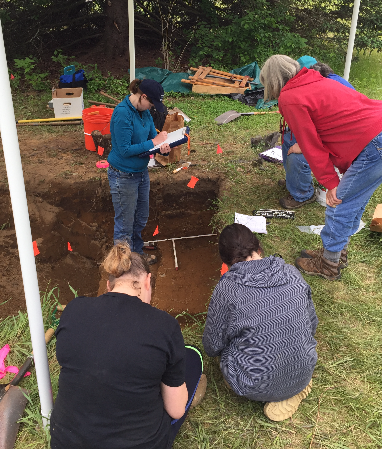
WCSU Summer Field School digging up (really old) dirt
In a departure from the typical “how I spent my summer vacation,” individuals with an interest in archaeology are participating hands-on in a dig with a team of researchers in Washington, Connecticut. The Western Connecticut State University Department of Social Sciences’ archaeological field school began last week and will run through Friday, June 23. And while it has already started, it is not too late to join as an independent study. The course is open to non-matriculating and non-WCSU students, as well as current students. For information about tuition and fees, contact the Cashier’s Office at (203) 837-8381 or www.wcsu.edu/cashiers/.
WCSU Professor of Anthropology Dr. Laurie Weinstein oversees Western’s Archaeology program and spent the past year writing grants and securing the materials needed to run the dig. Her past research includes multiple digs at a Revolutionary War encampment, a Paleo-Indian site in Gunnison, Colorado, and the homelands of the Weantinock Indians in New Milford.
When asked about this year’s dig site, Weinstein said, “This field school brings together a great team of people on a fantastic site. First of all, we are collaborating with UConn and doctoral candidate Zac Singer. Zac has a lot of the most recent field technologies that he will be sharing with our faculty team, which includes Dr. Cosimo Sgarlata, an expert in Paleo-Indian studies and Geographical Information Systems (GIS) mapping, and Dr. Bethany Morrison, an expert in organizing and running field schools and working with students to enable them to understand field strategies.”
Weinstein explained that the field site is a nationally recognized Paleo Indian site more than 9,000 years old. “Although the site was first excavated over 30 years ago, much of the site is still intact and relatively untouched,” she said. “This site is probably one of the coolest archaeological digs and one of the best opportunities for our students … ever! And they will be working with a great team of scholars.”
Weinstein indicated that the research is important “because it will potentially recover extensive amounts of new Paleo-Indian material, and if lucky, more carbon for additional dating. The excavation will include expert analysis from many disciplines, including ground-penetrating radar, soil analysis, paleo-botany, use-wear analysis, GIS mapping and, of course, Paleo-Indian archaeology.”
For more information about the program, contact Sgarlata at sgarlatac@wcsu.edu